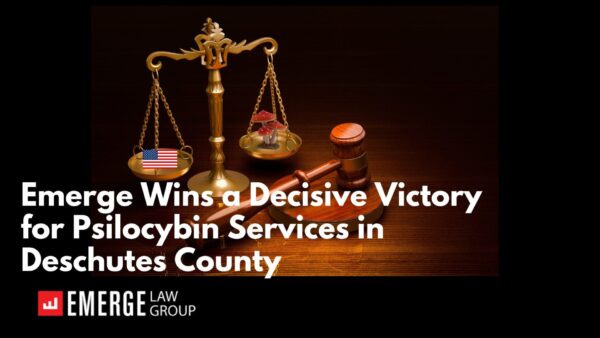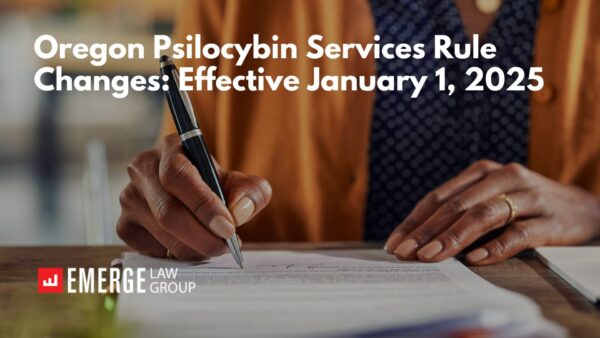I’m just an old corporate attorney. At the large firm I worked at for nearly 20 years, “dabbling” into practice areas in which you were not an expert was frowned upon. Become an expert in one or two areas of the law, stick with them, and let the other attorneys at the firm handle the stuff that they know better than you. That was the mantra, and I have found it a convenient philosophy to maintain. And so, for the past few years, I have done everything humanly possible to avoid learning and keeping up with the voluminous and ever-changing marijuana rules and regulations of the Oregon Health Authority and the Oregon Liquor Control Commission. That’s what my (younger) colleagues are for.
However, there are a few OLCC rules that a business attorney practicing in the marijuana industry simply cannot avoid, including the rules governing:
• Who is an “applicant” for purposes of an OLCC application;
• Who has a “financial interest” in a licensed business; and
• What happens if any of these things change.
Business transactions appear to be happening more than ever in the industry, and two of the most common questions we get are:
• Who, exactly, has to be on (or added to) the OLCC application?
• Is this going to slow up the deal?
The OLCC published new rules effective January 1, 2017, which included some changes to the definitions of “applicant” and “financial interest.” The rules cleared up some issues nicely. However, the rules do not provide an obvious answer to every business scenario. For some scenarios, it is necessary to determine the OLCC’s interpretation or policy with respect to a particular rule.
I and others at our firm have had a series of recent discussions with the OLCC on these rules to make sure that our firm’s advice to our clients is consistent with the OLCC’s interpretations and policies.
The following is a summary of the current rules, based on both the text of the rules and the OLCC’s current interpretations and policies of the same.
“Applicant”
The rules concerning applicants are relatively clear, and can be found at OAR 845-025-1030(3-4) and OAR 845-025-1045.
The following persons are applicants:
1. An individual or legal entity who holds or controls an interest of 10% or more in the licensed business;
2. An individual or legal entity (other than an employee acting under the direction of the owner) that: (i) exercises or is entitled to exercise control over the licensed business; (ii) incurs or is entitled to incur debt or similar obligations on behalf of the licensed business; or (iii) enters into or is entitled to enter into a contract or similar obligations on behalf of the business; and
3. An individual or legal entity identified as the lessee of the licensed premises.
Additionally, if a legal entity is an applicant, the following individuals within the legal entity are also applicants:
4. For a limited partnership, each general partner;
5. For an LLC, each member whose investment commitment or membership interest is 10% or more; and
6. For a corporation: (i) each director who owns or controls 3% or more of the voting stock; (ii) each principal officer; and (iii) each shareholder who owns or controls 10% or more of the voting stock.
Categories 1, 4, 5, and 6 have to do with ownership and the executive management team. These categories are always relevant and we focus on them all of the time.
There are definitely some logical inconsistencies with Categories 4 through 6, and there are a number of instances where different results would occur based solely on the form of the legal entity, even though there would appear to be no substantive differences between certain scenarios. For example, a 15% passive nonvoting member of a parent company LLC would be an applicant, whereas a 15% passive nonvoting shareholder of a parent company corporation would not be an applicant. These inconsistencies rarely “wag the dog” when organizing an entity structure, but they could.
The items in Category 2 do not frequently come into play, but they should never be overlooked. One not-uncommon scenario we have seen is when a licensed business hires a third-party management company that has the authority to enter into certain purchasing or other contracts on behalf of the business. In that case, the management company (and some or all of its owners, depending on the entity type of the management company) would be considered applicants of the licensed business.
Category 3 ideally should never arise because the legal entity that owns the licensed business should always be the lessee or sublessee on the lease. However, again, this item should not be overlooked.
“Financial Interest”
Here’s where it gets more interesting (which is an attorney’s way of saying less clear).
The term “financial interest” is defined in OAR 845-025-1015(20). The general definition states: “Financial interest” means having an interest in the business such that the performance of the business causes, or is capable of causing, an individual, or a legal entity with which the individual is affiliated, to benefit or suffer financially. The definition then provides a short non-exclusive list of scenarios that constitute a financial interest.
The definition does not specifically address many common business scenarios that we have encountered. And so, rather than take a guess at things, we felt the best move was to contact the OLCC to determine their current interpretations and policies regarding those scenarios.
We have learned that the following persons have a financial interest in a licensed business:
A. A direct or indirect equity owner of the licensed business (with one exception specified below);
B. An employee or agent who receives out-of-the-ordinary compensation;
C. A lender who lends money or property to an applicant or the licensed business for use in the business at a commercially unreasonable rate;
D. A person who gifts money or property to an applicant or the licensed business for use in the business;
E. The spouse of an applicant;
F. A person who receives out-of-the-ordinary consideration as a result of any commercial transaction;
G. A person who is entitled to receive any payment based on a percentage of profits, sales, or other performance metric of the licensed business;
H. The holder of an option or warrant to purchase a direct or indirect equity interest;
I. An employee or other service provider who is granted an option to acquire a direct or indirect equity interest;
J. The holder of a convertible promissory note;
K. A person who is granted a security interest in the assets or a direct or indirect equity interest; and
L. A person who has any right or potential right (based on any potential future contingencies) to acquire the assets or a direct or indirect equity interest.
Overall, this is a rather broad interpretation of the rule. Categories A through F are clear from (or are clearly implied by) the text of OAR 845-025-1015(20). For Category G, receiving a percentage of profits from a licensed business is also clearly implied by the text of the rule. However, receiving a percentage of sales or other performance metric is not. Likewise, the OLCC easily could have interpreted OAR 845-025-1015(20) differently with respect to Categories H through L. Still, this is the OLCC’s current interpretation.
And so what scenarios are we left with that do not constitute a financial interest?
In short: (a) ordinary and fair market value compensation and consideration; (b) unsecured loans at a commercially reasonable fixed interest rate; (c) fixed dollar payments (rather than percentages); (d) the absence of collateral having anything to do with the business; and (e) the absence of contingencies that could result in a person acquiring the assets or any direct or indirect equity interest in the business.
Additionally, the rules expressly provide for one specific exception to the general rule that every direct or indirect equity owner of a licensed business holds a financial interest. OAR 845-025-1015(20)(b) provides that a financial interest does not include any investment that the investor does not control in nature, amount or timing. While this language is not absolutely clear on its face, the OLCC’s interpretation is that this exempts persons who have invested in a company or financial fund that, in turn, invests in a specific licensed business (assuming that the exempt person is passive in nature and would not otherwise be considered an applicant). For example, if an individual buys shares in a public company and the public company, in turn, invests or has invested in one or more licensed businesses, then the individual investor would not be deemed to have a financial interest in the licensed businesses.
Of course, no list of all conceivable scenarios could ever be complete, and there are certainly scenarios that will arise that do not fit neatly into the text of the rules or the OLCC’s interpretations or policies regarding the same. Similarly, the OLCC could change its interpretations and policies at any time.
Consequently, before applying for or renewing any OLCC license, and before entering into any new business transaction that could potentially affect who may have a financial interest in a licensed business, it is always advisable to speak with an attorney (or, at a minimum, with the OLCC itself).
Distinction #1 – Criminal Background Checks
Based on the text of the rules, there is only one distinction between an applicant and the holder of a financial interest. The OLCC is required by statute to conduct a criminal background check on each applicant who is an individual. Applicants must submit fingerprints and other information to the OLCC. See OAR 845-025-1030(6)(a) and OAR 845-025-1080. The OLCC may require each individual who holds a financial interest to submit the information necessary for a criminal background check, but they are not required to do so by statute. See OAR 845-025-1030(7).
Distinction #2 – Changes
There is one other significant distinction between an applicant and the holder of a financial interest that is not in the text of the rules, but is instead based on the OLCC’s current policy position. OAR 845-025-1160(4) provides that a licensed business must obtain the OLCC’s preapproval before changing who has a financial interest in the business. Here is a link to the form that must be submitted to the OLCC if there is a change in financial interest or business structure: https://www.oregon.gov/olcc/marijuana/Documents/Licensing_Forms/mj_change_financial_fillable.pdf.
Although OAR 845-025-1160(4) and the OLCC’s change form apply to all financial interests, the OLCC’s current policy is that only the addition of a new applicant requires the preapproval of the OLCC. If a licensed business is adding a person that merely holds a financial interest (and who is not an applicant), then the licensed business can finalize the transaction first, and then notify the OLCC after the fact.
This is a significant benefit for businesses who are adding only financial interest holders and who do not want to delay the closing of the transaction.
Conclusion
The OLCC’s rules governing applicants, financial interest holders, and changes to the same are a bit complicated and are not always clear from the text of the rules themselves. Compliance is always important naturally, but these days perhaps it is more important than ever.
Before applying for or renewing any OLCC marijuana license, and before entering into any new business transaction that could potentially affect who may have a financial interest in a licensed business, it is advisable to speak with an attorney.
Finally, if you currently have an OLCC license and are uncertain whether you have disclosed to the OLCC all applicants and financial interest holders, you also should speak with an attorney. The OLCC considers violations of the applicant and financial interest rules to be serious Category I or Category II violations, depending on intent. Correcting an omission is certainly possible, but it should be undertaken with legal advice.
If you have any questions or issues, please contact any of our business attorneys or compliance and licensing attorneys.
We will update this blog if and when we become aware of any change in the OLCC’s interpretations or policies on this issue.





